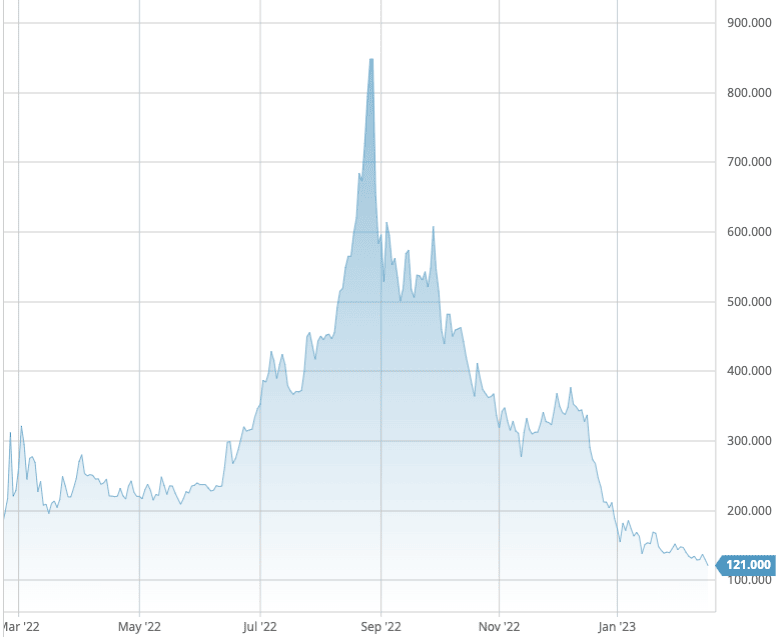Household Gas Bills to Fall, Offering a Significant Boost to UK Economic Outlook
- Written by: Gary Howes

Image © Adobe Images
The UK economic outlook has improved significantly owing to the recent fall in wholesale gas prices, which analysts say will ease the pressures bearing down on households from July onwards.
New estimates suggest the average household annual energy bill will slide by more than £800 from July amidst the ongoing decline in wholesale prices from record levels reached last summer.
New research from Investec shows Ofgem's price cap is forecast to fall to £2,165 from July, down from the £3,000 expected in April. (Bills will rise from 2.5K currently to £3K from April as the government raises the cap under its guarantee scheme.)
Investec meanwhile forecasts average annual bills will reach £2,190 from October.
The new July calculations follow the fall in UK wholesale month-ahead natural gas prices, which reached new multi-month lows last week amidst improved supplies, lower-than-typical demand and increased output from Europe's wind farms.
"The huge sigh of relief that Europe’s energy crisis appears to be over is still a cooling force on gas prices. UK natural gas futures are hovering around 120 pence per therm, levels not seen since early September 2021, while EU prices have edged up a little but still at 17-month lows," says Susannah Streeter, Head of Money and Markets Research at Hargreaves Lansdown.
Above: UK wholesale gas contract for March '23 delivery.
Investec's final estimate for the price cap in April is £3,332, meaning the government will pay £332 per household to cover its annual average energy bill.
Analysts at Cornwall Insight meanwhile say bills will fall nearly £850 from July as they see a more generous decline ahead.
The same analysts say the cap will hit £3,295 in April, implying a lower cost to the government than implied in Investec's calculations.
Cornwall Insight forecasts the price cap will fall to £2,161 from October, down from July's £2,153.
The developments mean the UK government's fiscal position will be much improved when compared to what was laid out in Jeremy Hunt's Autumn Statement, allowing more headroom ahead of the upcoming budget.
The government estimated the total cost of the Energy Price Guarantee at £37.6BN at the time of the Autumn Statement.
More important, however, is the boost these developments will have on UK consumer and business sentiment.
It also suggests the dour forecasts of the Bank of England, OBR and other institutions delivered at the start of the year will likely be revised higher, implying greater revenues for the Treasury than previously anticipated.
Can the Decline in Gas Prices Extend?
Natural gas supplied today is paid for at prices agreed many months prior, a market dynamic that explains how prices can be forecasted with accuracy.
The current winter prices are a result of last summer's surge in wholesale gas markets as buyers paid phenomenal prices amidst panic over Russia's curtailment of supply.
But the situation has improved immensely and gas rationing has been avoided, with European storage at around 65%, which is well above multi-year averages.
"European gas futures have now declined below €50/MWh for the first time in 17 months on milder weather reducing seasonal demand, efforts to curb gas consumption and new LNG supply," says Vivek Dhar, a commodities analyst at CBA.
But Dhar warns the outlook remains challenging.
"The risk of gas shortages are still on the table. Europe will likely need to import more LNG than it did last year in the upcoming northern summer months to compensate for lower Russian gas pipeline imports," he says in a recent research update.
"In the same time period, China will likely see LNG imports pick up by 15‑20%/yr as China’s economy re‑opens. How well Europe manages to replenish its gas storages in the summer months will set up the narrative for market conditions in the next winter," he adds.




